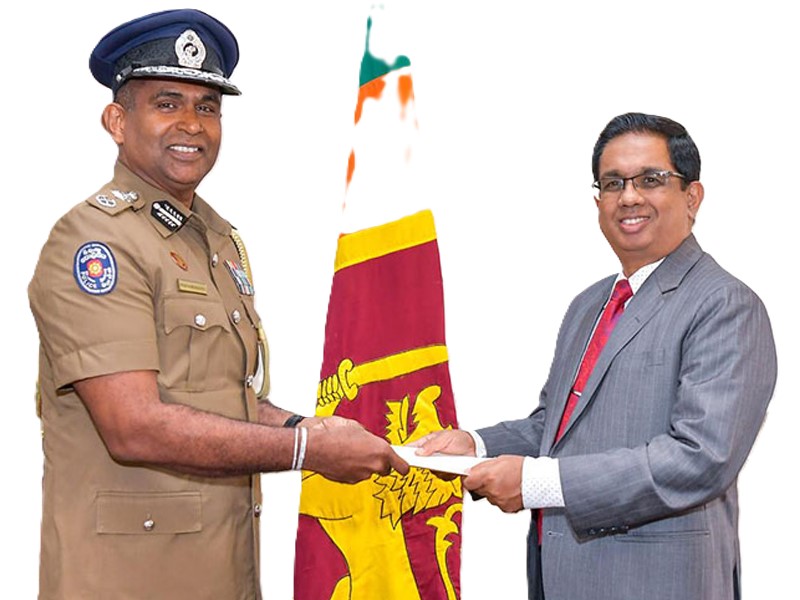(25/02/2025/ Sri Lanka Brief)
The Acting IGP has stated that he has become a nominal IGP due to the Police Commission’s interference in the internal affairs of the police. He wants the power of the appointments, transfers and disciplinary actions in the police should be removed from the commission and transferred back to the IGP.
He expressed these views at a media briefing held at the Government Information Department on the 22 this month. Accordingly, it can be assumed that the National People’s Power government accepts the opinion of the IGP.
The Acting IGP has also said that:
‘The Police Commission operates according to the current law in Sri Lanka. But what we see in the world is that the Police Commission exists, not to control the internal affairs of the police. Whether it is the United States or other countries, the Police Commission is working to resolve public issues and take action on police misconduct. But putting both of those aside, the Commission has come to the point of interfering in the internal affairs of the police. This is because it has been established in the wrong footing.
Due to this situation, we are unable to control the affairs of the police. I have informed the Police Commission in writing regarding this. Without these three things, appointments, transfers, and disciplinary actions, the IGP becomes a nominal position. Therefore, we cannot provide the necessary justice. Our idea is that these affairs should be assigned to the police.’
Acting IGP demands old powers IGP position enjoyed before the Independent commissions were established.
According to Acting IGP Priyantha Weerasooriya, the Police Commission, which has evolved through various reforms since the 17th Amendment, is a problem. This Acting IGP wants to get the powers he had before 2007.
The proposal to establish a police commission was initially brought by the Janatha Vimukthi Peramuna led by Anura Kumara Dissanayake himself in 2007. The Police Commission has had the same characteristics since its inception. Now Priyantha Weerasooriya, the acting IGP of the current NPA government wants these powers removed.
What he does in fact is to criticise the National Police Commission, which was established by the Janatha Vimukthi Peramuna in conjunction with the Chandrika Kumaratunga government.
Expressing his views on this matter, the Chairman of the National Police Commission, Lalith Ekanayake, has emphasized that the Commission must carry out the duties assigned to it by the Constitution. The Chairman pointed out that the Commission is carrying out that responsibility and therefore the IGP has no right not to implement the orders given by the Commission. The Chairman further stated that whether the IGP likes it or not, blaming the Commission will be of no use, and said that these problems can be resolved if the government changes the Constitution. The chairman has also stated to the Times.lk website that the commission cannot neglect its duties assigned by the constitution until then.
The chairman of the National Police Commission has further expressed his views and said:
‘The IGP has been entrusted with the responsibility of making appointments, transfers and disciplinary actions in the Sri Lanka Police from the Police Constable to the Chief Inspector of Police. From there, the responsibility of carrying out these activities from the Assistant Superintendent of Police to the Deputy Inspector General of Police has been entrusted by the constitution to the National Police Commission. These activities are currently carried out according to the rules of procedure for promotion and transfer of the Public Service Commission. But it has been three months since these were made in a way that suits the police and submitted for the approval of the IGP. We have not received his response yet. We have to do these activities according to the current situation. Otherwise, if these powers are given to the IGP outside the constitution, we will be sued in the Supreme Court for fundamental rights.
According to the constitution, only the Supreme Court and the Labour Court can challenge a decision taken by the Police Commission. We work according to the existing law. Even if there are some problems with it, it is not our problem.’
The National Police Commission section of Chapter 18 of the Constitution states as follows.
The Inspector General of Police can be brought before the court!
“155 (e) – Every person who, other than in the exercise of his lawful functions, directly or indirectly, by himself or through any other person or in concert with any other person, influences or attempts to influence or improperly interferes in any manner with any decision of the Commission or any of its committees, or who so influences a member of the Commission or any of its committees, shall be guilty of an offence and shall, on conviction, be liable to a fine of one hundred thousand rupees or to imprisonment for a term not exceeding seven years or to both such fine and such imprisonment.”
The Inspector General of Police of the NPA government seems to have no idea about the checks and balances brought in from the 17 to the 21 Amendments. On the other hand, the NPA government does not seem to be taking steps to reinstate the Constitutional Council and the Independent Commissions, which were distorted and made ineffective by the Rajapaksas.
The harm of relying on such individuals was evident from the murder that took place in the courtroom the other day. Despite receiving information that Ganemullae Sanjeewa would be killed in a courtroom, the acting IGP did not take any security measures.
Will the NDA government support legal action against the acting IGP?
By Asoka Jayawardena.
(This article has used some excerpts from an article published by Shalika Wimalasena on thetime.lk, but please note that the emphasis of that article and this article is different.)
